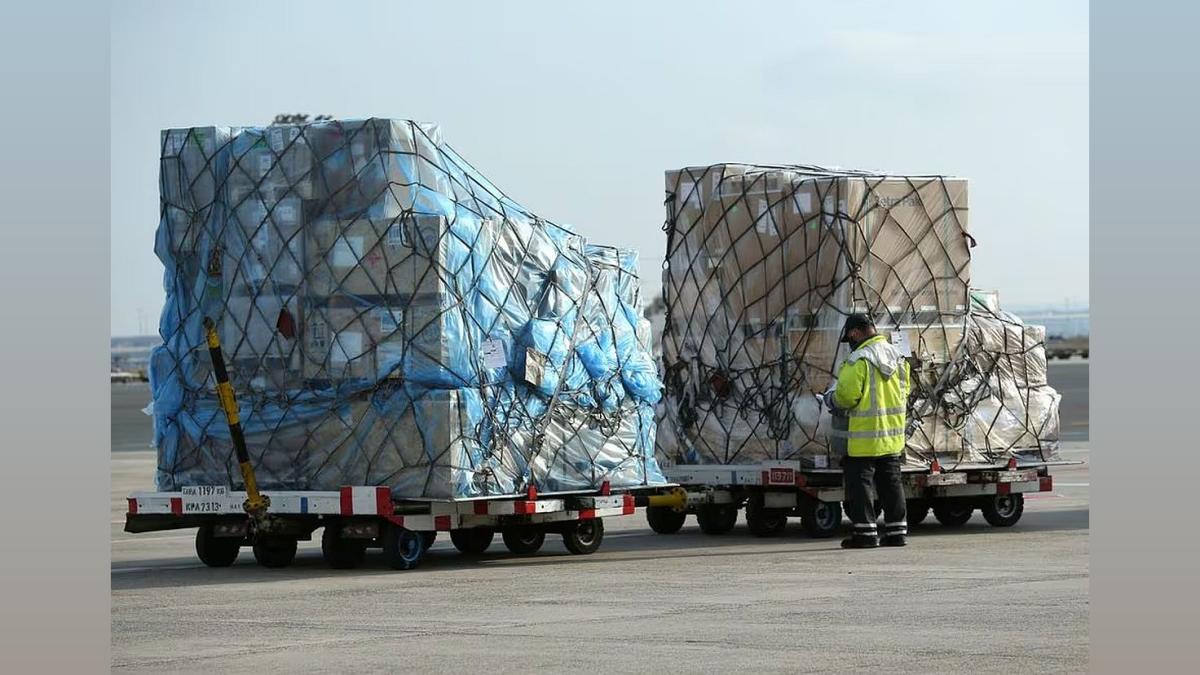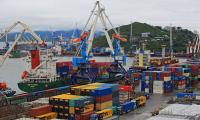India Logistics Sector Outlook 2024: Growth & Challenges
India's logistics sector is poised for growth in 2024 driven by demand, investments, and government initiatives. However, global supply chain disruptions and the Red Sea crisis pose challenges.

Photograph: Ralph Orlowski/Reuters
Mumbai, Dec 29 (PTI) Fuelled by demand, manufacturing activities, and investments, the horizon of the country's logistics industry looks "promising" for 2024, though Red Sea might cast a shadow of global supply disruptions and push up freight costs.
Not just the market tailwinds, the government's key initiatives spanning from PM Gati Shakti to the maritime policy to the Sagarmala project will also set the tone for the logistics landscape next year, according to experts.
"In 2023, India's logistics sector showcased commendable progress. The government's strategic investments and commitment to digitalisation have been instrumental in this growth. As we step into 2024, the sector's outlook remains promising," Grégory Goba-Blé, Managing Director for UPS in India, said.
To complement the PM Gati Shakti, the government, in 2022, rolled out a comprehensive national policy for the logistic sector to address the issues of high logistics cost and inefficiencies, among others.
The policy helped India climb six places to the 38th position among 139 countries in the seventh edition of the World Bank Logistics Performance Index 2023.
In the wake of the coronavirus pandemic, the e-commerce boom has driven a heightened demand for logistics services, emphasising the importance of speed in order fulfilment, storage flexibility, and customer satisfaction.
Last-mile delivery and returns processing/reverse logistics have been the buzzwords throughout the year, with companies focusing on solving these challenges to meet customer expectations.
In 2024, the logistics sector is poised for significant advancements and transformative shifts in response to emerging trends, experts said.
Nirav Doshi, Founder & Managing Director of NIDO Group, said tier-II/III cities will be game changers as SMEs come to the growth's forefront while warehouse automation, a driving force in recent years, is set to continue revolutionising the warehousing industry.
The general elections are scheduled for early 2024 and it will be keenly watched by global investors and manufacturing companies.
The upcoming regime has the potential to enact policies that not only mitigate risks highlighted by recent crises but also position India as a global logistics hub, Flomic Global Logistics Managing Director Lancy Barboza said.
According to Homi Katgara, Partner at Jeena & Company, government initiatives promoting inland waterways, developing smaller ports, and increasing the number of airports, present exciting avenues for growth.
'The global trade is witnessing a slowdown in demand due to subdued macroeconomic environment. However, on the domestic front, India has emerged as a bright spot," Allcargo Group Chief Strategy Officer Ravi Jakhar said.
The sustained revival of manufacturing activities and consumer demand have increased the logistics service demand in India, he added.
Noting that the geopolitical developments will continue to keep the trade on its toes, he said owing to the subdued global demand scenario, the capacity is expected to remain underutilised in the first half of 2024.
Jakhar also said sustainability is another key driver as more and more companies are becoming ESG conscious and that sustainable or green logistics practices will become more dominant in 2024.
However, the Red Sea crisis has directly impacted India, which heavily relies on maritime trade, Ambrish Kumar, Founder-CEO of ZipaWorld Innovation Pvt Ltd, said.
The Red Sea, accounting for 12 per cent of global trade and 30 per cent of container traffic, serves as a crucial link in the global supply chain. With the Suez Canal shortening voyages between the East and West, the Red Sea acts as a bridge for millions of containers carrying everything from electronics and garments to oil and agricultural products.
With 20 per cent of Indian exports passing through the Suez Canal and Red Sea route, the disruption translates to significant economic repercussions, Kumar said.
He also said vessel insurance costs are skyrocketing and freight charges are surging 30-40 per cent.
The latest attacks on Israel-linked vessels in the Red Sea have exposed the vulnerability of global supply chains. "As we enter 2024, business outlook remains uncertain," Amit Maheshwari, Founder & CEO of Softlink Global Pvt Ltd, said.
Globally, business outlook depends on how long supply chain disruptions, energy price volatility and geopolitical tensions in the Red Sea region persists, he said, adding that the drone attack in the Indian Ocean also highlights evolving asymmetric threats.
"The overall container and freight cost has already gone up due to longer time and high insurance cost in the wake of the development in the Red Sea. Right now we are on wait-and-watch mode. But if the issue persists for long, 2024 could see emergence of new realities as far as logistics and supply chain is concerned," a sectoral expert said.
Looking at 2024, Mahendra Shah, Chairman and Managing Director of V-Trans (India) Ltd, said there are expectations of sustained momentum, focus on reducing logistics costs, streamlined processes, enhanced infrastructure, and a collaborative industry-government approach.
"As we reflect on trade dynamics of 2023 and anticipate the path forward in 2024, it is evident that geopolitical changes have led to significant shifts.
"Beyond macros, we're witnessing trends such as reshoring, nearshoring, and the integration of advanced technologies like AI, blockchain, IoT, big data, and predictive analytics in supply chains," Ashwani Nath, Chief Commercial Officer for Logistics at DP World Subcontinent, said.
Kami Viswanathan, President, Middle East, Indian Subcontinent and Africa at FedEx, said in 2024, we will see a significant focus on making supply chains smarter by unleashing the power of digital intelligence.
"Navigating the intersection of the digital and physical worlds, a tech-driven approach extends beyond global connectivity and seamless commerce. For instance, technology is empowering customers to track carbon emissions of their shipments, contributing to a more sustainable future," she said.
Not just the market tailwinds, the government's key initiatives spanning from PM Gati Shakti to the maritime policy to the Sagarmala project will also set the tone for the logistics landscape next year, according to experts.
"In 2023, India's logistics sector showcased commendable progress. The government's strategic investments and commitment to digitalisation have been instrumental in this growth. As we step into 2024, the sector's outlook remains promising," Grégory Goba-Blé, Managing Director for UPS in India, said.
To complement the PM Gati Shakti, the government, in 2022, rolled out a comprehensive national policy for the logistic sector to address the issues of high logistics cost and inefficiencies, among others.
The policy helped India climb six places to the 38th position among 139 countries in the seventh edition of the World Bank Logistics Performance Index 2023.
In the wake of the coronavirus pandemic, the e-commerce boom has driven a heightened demand for logistics services, emphasising the importance of speed in order fulfilment, storage flexibility, and customer satisfaction.
Last-mile delivery and returns processing/reverse logistics have been the buzzwords throughout the year, with companies focusing on solving these challenges to meet customer expectations.
In 2024, the logistics sector is poised for significant advancements and transformative shifts in response to emerging trends, experts said.
Nirav Doshi, Founder & Managing Director of NIDO Group, said tier-II/III cities will be game changers as SMEs come to the growth's forefront while warehouse automation, a driving force in recent years, is set to continue revolutionising the warehousing industry.
The general elections are scheduled for early 2024 and it will be keenly watched by global investors and manufacturing companies.
The upcoming regime has the potential to enact policies that not only mitigate risks highlighted by recent crises but also position India as a global logistics hub, Flomic Global Logistics Managing Director Lancy Barboza said.
According to Homi Katgara, Partner at Jeena & Company, government initiatives promoting inland waterways, developing smaller ports, and increasing the number of airports, present exciting avenues for growth.
'The global trade is witnessing a slowdown in demand due to subdued macroeconomic environment. However, on the domestic front, India has emerged as a bright spot," Allcargo Group Chief Strategy Officer Ravi Jakhar said.
The sustained revival of manufacturing activities and consumer demand have increased the logistics service demand in India, he added.
Noting that the geopolitical developments will continue to keep the trade on its toes, he said owing to the subdued global demand scenario, the capacity is expected to remain underutilised in the first half of 2024.
Jakhar also said sustainability is another key driver as more and more companies are becoming ESG conscious and that sustainable or green logistics practices will become more dominant in 2024.
However, the Red Sea crisis has directly impacted India, which heavily relies on maritime trade, Ambrish Kumar, Founder-CEO of ZipaWorld Innovation Pvt Ltd, said.
The Red Sea, accounting for 12 per cent of global trade and 30 per cent of container traffic, serves as a crucial link in the global supply chain. With the Suez Canal shortening voyages between the East and West, the Red Sea acts as a bridge for millions of containers carrying everything from electronics and garments to oil and agricultural products.
With 20 per cent of Indian exports passing through the Suez Canal and Red Sea route, the disruption translates to significant economic repercussions, Kumar said.
He also said vessel insurance costs are skyrocketing and freight charges are surging 30-40 per cent.
The latest attacks on Israel-linked vessels in the Red Sea have exposed the vulnerability of global supply chains. "As we enter 2024, business outlook remains uncertain," Amit Maheshwari, Founder & CEO of Softlink Global Pvt Ltd, said.
Globally, business outlook depends on how long supply chain disruptions, energy price volatility and geopolitical tensions in the Red Sea region persists, he said, adding that the drone attack in the Indian Ocean also highlights evolving asymmetric threats.
"The overall container and freight cost has already gone up due to longer time and high insurance cost in the wake of the development in the Red Sea. Right now we are on wait-and-watch mode. But if the issue persists for long, 2024 could see emergence of new realities as far as logistics and supply chain is concerned," a sectoral expert said.
Looking at 2024, Mahendra Shah, Chairman and Managing Director of V-Trans (India) Ltd, said there are expectations of sustained momentum, focus on reducing logistics costs, streamlined processes, enhanced infrastructure, and a collaborative industry-government approach.
"As we reflect on trade dynamics of 2023 and anticipate the path forward in 2024, it is evident that geopolitical changes have led to significant shifts.
"Beyond macros, we're witnessing trends such as reshoring, nearshoring, and the integration of advanced technologies like AI, blockchain, IoT, big data, and predictive analytics in supply chains," Ashwani Nath, Chief Commercial Officer for Logistics at DP World Subcontinent, said.
Kami Viswanathan, President, Middle East, Indian Subcontinent and Africa at FedEx, said in 2024, we will see a significant focus on making supply chains smarter by unleashing the power of digital intelligence.
"Navigating the intersection of the digital and physical worlds, a tech-driven approach extends beyond global connectivity and seamless commerce. For instance, technology is empowering customers to track carbon emissions of their shipments, contributing to a more sustainable future," she said.
You May Like To Read
TODAY'S MOST TRADED COMPANIES
- Company Name
- Price
- Volume
- Vodafone-Idea
- 11.36 ( -2.49)
- 94664837
- AvanceTechnologies
- 1.16 (+ 4.50)
- 34522155
- Sunshine-Capital
- 0.26 ( -3.70)
- 29015901
- Alstone-Textiles
- 0.27 ( -3.57)
- 28695959
- Mehai-Technology
- 1.65 ( -4.62)
- 28262795






